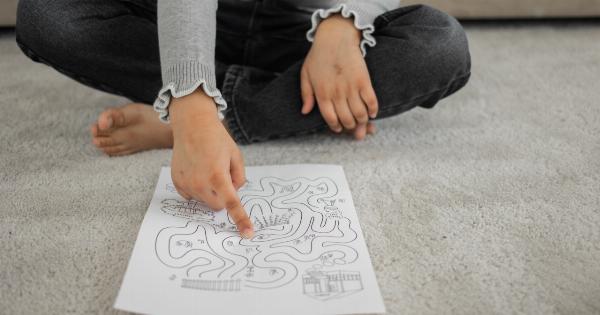Melatonin is a hormone that regulates sleep and wakefulness. It is naturally produced by the pineal gland in the brain and helps control our body’s internal clock.
Many people turn to melatonin supplements to help with sleep issues such as insomnia or jet lag. However, finding the right dosage can be a challenge. Too little may not be effective, while too much can lead to side effects. In this article, we will explore the science behind melatonin dosage and how to achieve the perfect balance.
Understanding Melatonin’s Role in Sleep
Before delving into dosage, it’s important to understand how melatonin works. Our body’s natural production of melatonin is influenced by light.
When it’s dark, the pineal gland releases melatonin, signaling to the body that it’s time to sleep. Conversely, when it’s light, melatonin production is suppressed, promoting wakefulness.
Melatonin works by binding to melatonin receptors in the brain, particularly in the hypothalamus. These receptors help regulate our sleep-wake cycle, also known as the circadian rhythm.
By interacting with these receptors, melatonin helps promote sleepiness and regulate the timing and quality of our sleep.
The Importance of Proper Dosage
Determining the right dosage of melatonin involves finding the sweet spot that helps you fall asleep and stay asleep without causing grogginess or other side effects.
It’s important to remember that melatonin is not a sedative but a sleep regulator.
Starting with a low dosage and gradually increasing it until you find your ideal dosage is recommended. Factors such as age, weight, and the severity of sleep issues can influence the appropriate dosage for you.
It’s always advisable to consult with a healthcare professional if you have any doubts or concerns.
Melatonin Dosage for Adults
For adults, the general recommended dosage of melatonin is between 0.5 and 5 milligrams. It’s best to start with the lowest effective dosage and gradually increase it if necessary.
Some individuals may find 0.5 milligrams sufficient, while others may require 3 to 5 milligrams.
It’s important to remember that melatonin should be taken 30 minutes to an hour before bedtime. Taking it too late or too early may disrupt the circadian rhythm and affect sleep quality.
Additionally, melatonin supplements are not meant for long-term use. It’s advisable to use it for short-term sleep problems or as directed by a healthcare professional.
Melatonin Dosage for Children
Melatonin can also be used for children who struggle with sleep issues. The dosage for children depends on their age and weight. It’s crucial to consult with a pediatrician before giving melatonin to children.
They will be able to recommend the appropriate dosage based on the child’s needs and health condition.
Generally, children aged 6 months to 5 years can start with a dosage of 0.5 milligrams. Children aged 6 to 12 years typically require 1 milligram, while teenagers can take 1 to 3 milligrams.
Again, it’s important to follow the pediatrician’s advice and start with the lowest effective dosage.
Melatonin and Timing
The timing of melatonin intake is crucial to its effectiveness. As mentioned earlier, melatonin should be taken 30 minutes to an hour before bedtime. This allows enough time for it to be absorbed and start working.
Taking melatonin too early may result in drowsiness during the day, while taking it too late may delay sleep onset.
Exposure to light can also affect melatonin production. It’s advisable to dim the lights and avoid exposure to bright screens, such as phones or tablets, before bedtime.
These devices emit blue light, which can suppress melatonin production and interfere with the sleep-wake cycle.
The Risk of Overdosing
While melatonin is generally safe, taking too much can lead to side effects such as daytime sleepiness, dizziness, headaches, and even disrupt the natural circadian rhythm.
It’s important to follow the recommended dosage and avoid exceeding it without medical supervision.
Additionally, melatonin may interact with certain medications, such as blood thinners, antidepressants, and immunosuppressants.
If you’re taking any medications, it’s crucial to consult with a healthcare professional before starting melatonin supplementation.
Other Factors to Consider
Aside from dosage and timing, there are other factors to consider when using melatonin for sleep issues.
Creating a conducive sleep environment, practicing relaxation techniques, and maintaining a consistent sleep schedule can also contribute to better sleep quality.
If you’re struggling with chronic sleep problems, it’s important to address the underlying causes. Stress, anxiety, and poor sleep habits can all impact sleep quality.
A holistic approach that combines lifestyle changes, relaxation techniques, and, if necessary, appropriate medical treatment may be beneficial.
Conclusion
Getting the right dosage of melatonin is crucial to achieving better sleep. Starting with a low dosage and gradually increasing it, if necessary, is recommended for adults and children.
Timing is also important, with melatonin being taken 30 minutes to an hour before bedtime. Avoiding bright lights and electronic screens before sleep can also enhance melatonin’s effectiveness.
Remember, melatonin is not a magical cure for sleep problems but a tool to help regulate the sleep-wake cycle.
If you’re unsure about the proper dosage or have any concerns, it’s always best to consult with a healthcare professional who can guide you on finding the perfect balance.




























